#german diplomacy
Explore tagged Tumblr posts
Text
Guerre en Ukraine : ce qu'il faut retenir de la journée du vendredi 23 décembre
"Guerre en Ukraine : ce qu'il faut retenir de la journée du vendredi 23 décembre" https://www.francetvinfo.fr/monde/europe/manifestations-en-ukraine/guerre-en-ukraine-ce-qu-il-faut-retenir-de-la-journee-du-vendredi-23-decembre_5560692.html
Comment interpréter le conflit limité à l'Ukraine ?
How to understand the limited conflict to Ukraine ?
Comme la division au sein du monde russophone, au seul profit d'un extrême occident peu regardant sur les moyens d'y parvenir ?
Like division inside russophonic world, only to benefit of the United States with little regard on the means to address It ?
L'objectif, commun à la Russie et aux Etats-Unis, serait d'affaiblir durablement la capacité d'émancipation politique et économique d'une Europe débutante sur la scène internationale.
The main task for jointly United States and Russia could be to low down the economic and political emancipation of a beginning Europe on the international scene.
Et... Pour une Europe, sous leadership allemand, conséquemment de reprocher à la France un suivisme atlantiste incompatible avec cette Europe libérée de toutes entraves.
And... For Europe under German leadership, consequently, diminishes a too atlantist France not in phase with a freed Europe from all brakes.
La Russie et l'Amerique seraient d'accords pour garder une Europe non libre, soumise à leur bon vouloir...
Russia and America agreed to stay Europe without freedom, submitted to their free will...
Cette rivalité orient-occident, qui date de l'Égypte et de la Mésopotamie puis de la Grèce antique et de la Perse ancienne, puis encore de Rome et de l'Ottoman, masque mal une forte opposition nord-sud, entres riches nations et pays pauvres avides de richesses et d'accession au pouvoir, entre abolitionnistes de la vie et esclavagistes, les uns éliminent leurs adversaires irréductibles, les autres font des prisonniers, font chanter ceux qu'ils jugent propres à défendre leurs intérêts.
Tout cela a trait à la conquête et au gouvernement du monde.
This east-west rivalry, from Egypt and Mesopotamia then antic Greece and ancient persan world, then more Roma and Ottoman empire, is hidding a strong opposition between north-south, rich nations and poor ones motivated by richnesses and access to powers, between abolitionists of life and slavers, the ones eliminate their foes, the others make captives, blackmailed those they think are properly good for their own interests.
All is about conquest and government of the world.
Après Rome et Constantinople, Paris et Vienne restent les deux seules villes libres d'occident. Convoitées par les pirates de la mer ou du désert et de la steppe, les anglo-normands et les turco-mongols, du sud ou du nord, pillage de ressources plutôt que création de richesses.
l'Europe est appelée à relever le flambeau d'occident abandonné, contraint et forcé, par les Amériques. Il faut lutter, défendre et contrer l'offense qui nous est faite !
After Roma and Byzance, Paris and Vienna stay the two only free cities of western nations. Rovers of the seas, desert or steppa, the anglo-northmen and turco-mongols, from south or north, pillards of ressources rather than creators of richnesses.
Europe is called to be the flag of the western nations lost, constraint and forced, by America. We have to fight, defend and battle offences which are addressed to us !
#news#history#france#european union#us politics#russian federation#ukrainian crisis#international policy#submission#freedom#german diplomacy#emancipation#north south divide#rich#poor#killer#slaver#conquest#government#parisfrance#vienna#roma#constantinople#northmen#turco#creators#pillards
1 note
·
View note
Text
youtube
In a significant diplomatic move, German Chancellor Olaf Scholz called for peace in Ukraine during his first phone call with Russian President Vladimir Putin in over two years. This article delves into the key moments of the call, including Scholz’s strong condemnation of Russia’s war and Putin’s insistence on territorial issues. With the conflict now in its third year, can this renewed dialogue lead to peace? Watch the full breakdown of this critical conversation and what it means for the future of Ukraine.
#Youtube#latestnews#newstoday#breaking news#Scholz#Ukraine war#Russia-Ukraine conflict#Putin#Olaf Scholz#peace negotiations#NATO#Russian-German relations#diplomacy#European politics#Ukraine news#Putin and Scholz#war in Ukraine#peace talks#international relations#Ukraine crisis#Russian aggression
1 note
·
View note
Text
youtube
#youtube#news#diplomacy meeting#transatlantic relations#State Department#press conference#bilateral meeting#diplomatic talks#German Foreign Minister Baerbock#Washington DC#Germany#politics#Secretary Blinken#United States#diplomacy#meeting#alliance#government#foreign relations#Washington meeting.#Diplomatic Showdown#Press Conference#Politics#Diplomacy#DC#Meeting#Diplomatic Relations#Summit#Government#Foreign Relations
0 notes
Text
World: The West Isn't Buying Into China's Year of Diplomacy

Chinese President Xi Jinping at a press conference in Shaanxi, on May 19, 2023. A new poll indicates that the West does not believe that China is contributing to Global Security. Florence Lo/Pool/AFP Via Getty Images
Western nations increasingly see China as an interventionist power that is not improving global security, according to recent polling, as Beijing struggles to square its desired peacemaker image with the political realities of its expanding global influence.
The Pew Research Center conducted a 30,000-person survey across 24 nations between February and May and found that people living in European, North American and Indo-Pacific democracies are particularly wary of China's influence. The sentiment was less strong, though still present, among African and South American respondents.
A median of 71 percent of the 30,000 people polled felt that China does not contribute either much or at all to international peace and stability, versus 23 percent who felt China does. Americans (80 percent), Dutch (86 percent), British (80 percent), Germans (80 percent), and French (75 percent) were among those who felt most strongly that Beijing is a negative influence on global affairs.
Democratic Indo-Pacific nations emphatically agreed, with 87 percent of South Koreans, 85 percent of Australians, and 85 percent of Japanese feeling the same.
The list of nations—the United States, Canada, France, Germany, Greece, Italy, Japan, Netherlands, South Korea, Spain, Sweden, the United Kingdom, Argentina, Brazil, Hungary, India, Indonesia, Israel, Kenya, Mexico, Nigeria, Poland and South Africa, and Australia—is dominated by Western liberal democracies, with inherent ideological tensions likely somewhat explaining the negative views of Chinese foreign influence.
But only in Indonesia, Kenya and Nigeria did a majority of respondents say Beijing contributes either a fair amount or a great deal to international peace and stability.
Newsweek reached out to the Chinese Foreign Ministry via email for comment.
China—already considered by many an economic and technological superpower—is still shaping its military and diplomatic clout abroad. Major decades-long investment in the former is openly intended to eventually challenge American hegemony, but on the diplomatic battlefield, Beijing is following a less publicly combative path.
Among the salient diplomatic issues that have helped shape global opinions of China this year are one striking success and one ongoing failure.
The former was the landmark Iran-Saudi Arabia normalization deal signed in April, in which China unexpectedly brokered a détente few thought likely given the deep and historic animosity between the Middle East's power players.
But China's unconvincing neutrality regarding Russia's war on Ukraine has somewhat eroded global trust in Beijing, particularly among the Euro-Atlantic and Indo-Pacific nations rallying to Kyiv's cause. China's de facto backing for Russia has undermined its continued calls for peace and the anemic peace plan it proposed in March.
North vs. South
Larger issues involving China—among them the fate of Taiwan, the situation in the South China Sea, lingering frustrations about the pandemic, the brewing showdown with the U.S., human rights, and concerns about political interference—have "completely dwarfed" Beijing's diplomatic efforts, Andrew Small, a senior transatlantic fellow at the German Marshall Fund, told Newsweek.
"Publics have evidently not seen either the Saudi-Iranian deal as particularly significant or the Chinese efforts on Ukraine as particularly credible," Small said.
Small noted Beijing will not necessarily be too concerned with continued Western skepticism.
"In one sense, the argument for what China has been trying to do on Ukraine and in some of these other efforts was positioning in the 'Global South,'" he said. "The view on their side had been that no one in Europe is going to take this seriously, but they are able to position themselves through this in the Global South as an actor that approaches these issues in a neutral way."
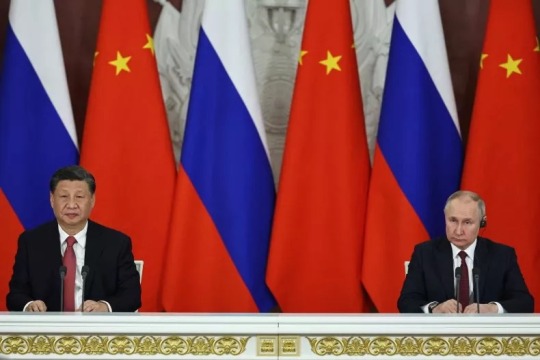
Russian President Vladimir Putin (R) and China's President Xi Jinping deliver a joint statement in Moscow, on March 21, 2023. China's de facto support of Russia's war on Ukraine has angered Western nations. Mikhail Tereshchenko/Sputnik/AFP Via Getty Images
But the poll's findings also suggest that Beijing's self-framing might not be playing out as it hoped. A median of 57 percent of those surveyed said they felt China interferes in other countries affairs either a fair amount or a great deal.
The sentiment was most notable in Europe, where a majority of national respondents excluding Hungarians agreed, as well as in North America. A majority of all those in Indo-Pacific nations apart from Indonesia saw Beijing as interventionist.
Even in the four of the six African and South American nations surveyed a majority said China intervened at least somewhat in other countries' affairs. Fifty percent of South Africans and 46 percent of Argentinians also agreed.
"It's such a mantra in Chinese foreign policy, so foundational in the way that they frame things that this is not what they do, and it is the antithesis of the Western approach," Small said.
Against this backdrop, Small added, it is "striking" to see so many nations feeling that China is indeed intervening abroad. The data suggests, he said, that the perception of Chinese anti-interventionism is being "shredded."
Recent months have seen a renewed China-U.S. effort to thaw chilly bilateral relations. In June, Secretary of State Antony Blinken visited Beijing to meet with Chinese President Xi Jinping. And earlier this week, Blinken told CNN the U.S. wants to "put some stability into the relationship."
But the long-term disputes show no signs of easing. While visiting Tonga this week, Blinken hit out at what he called China's "increasingly problematic behavior" in the Indo-Pacific.
In Europe too, major nations are increasingly concerned about Chinese espionage and influence, even if leaders like French President Emmanuel Macron and German Chancellor Olaf Scholz are still courting investment.
Worsening Euro-Atlantic ties with Beijing, Small said, might accelerate a brewing confrontation.
"To a certain extent, this will validate an analysis on the Chinese side that starts to write off the West," he said, and instead focus on a "winnable" public opinion battle in the developing world.
— Newsweek Magazine | By David Brennan | July 27th, 2023
#World#China 🇨🇳#Diplomacy#Western Nations#Peacemaker Image#Beijing#Global Influence#China's Influence#Americans 🇺🇸 Dutch 🇳🇱 British 🇬🇧 Germans 🇩🇪 French 🇫🇷#Iran 🇮🇷 Saudi Arabia 🇸🇦#Russia 🇷🇺 Ukraine 🇺🇦#Taiwan 🇹🇼#South China Sea#Andrew Small#German Marshall Fund#Global South#Europe 🇪🇺#North America#Indo-Pacific Nations#South Africans#China🇨🇳 | U.S. 🇺🇸#Secretary of State Antony Blinken#Tonga 🇹🇴#Chinese President Xi Jinping#French President Emmanuel Macron#German Chancellor Olaf Scholz#Euro-Atlantic#Developing World
0 notes
Text
In Nord Stream bombings probe, German investigators see Ukraine link, reports say
BERLIN — German prosecutors have found “traces” of evidence indicating that Ukrainians may have been involved in the explosions that blew up the Nord Stream gas pipelines in September 2022, according to German media reports Tuesday. Investigators identified a boat that was potentially used for transporting a crew of six people, diving equipment and explosives into the Baltic Sea in early…

View On WordPress
#Denmark#Diplomacy#Energy infrastructure#Energy supply#EU-Russia relations#Foreign policy#German politics#Germany#Pipelines#poland#russia#Sweden#ukraine#Volodymyr Zelenskyy#War in Ukraine
0 notes
Text
Nerva is one of my favorite Roman emperors, because he basically did fuck-all and then died, but he still gets to be one of the Five Good Emperors purely for getting Trajan in as his successor
Vaguely maddening how the Romans kept discovering time and time and time again that hereditary monarchy was a terrible system and that in the brief periods that they deviated from it by running succession based on merit things actually ran pretty smoothly, and yet they never ever learned this lesson
#shoutouts also to didius julianus#(literally bought the emperorship as it was being auctioned off by the praetorian guard)#(promptly assassinated)#and Valentinian I#(got so mad trying to do diplomacy with germanic envoys that he had a stroke and died on the spot)
197 notes
·
View notes
Text
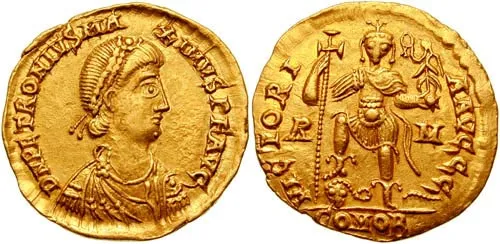
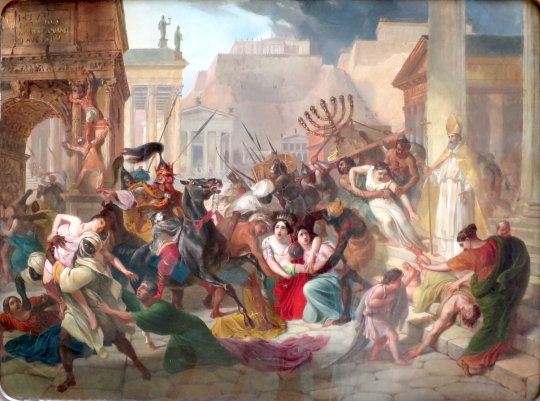
Petronius Maximus --- The dipshit Roman emperor who caused the sack of Rome because he was an arrogant dipshit.
Petronius Maximus was a wealthy Roman politician born in 397 AD to old Roman money. Like many wealthy Romans he went into politics and throughout the early 5th century climbed the ranks of Roman government until he became one of the most powerful men in the Western Roman Empire. He was crafty and he was ambitious. He was also a dipshit and an asshole.
By the 450's P. Maximus had a clear plan, to create a power vacuum in Rome that he could cunningly fill. He began by turning the emperor at the time, Valentinian III, against his magister militum Flavius Aetius. As magister militum Aetius was commander of the Roman Army, and had proven himself a master tactician and brilliant diplomat. Through military victories and diplomacy Aetius was barely holding a crumbling empire together. Maximus convinced Valentinian III that Aetius was looking to usurp his throne. Thus in 454 Valentinian summoned Aetius to his palace and personally murdered him with his sword. Maximus had organized the death of the most talented Roman official in the empire, which in the grand scheme of things was probably a big mistake. With Aetius dead, Maximus expected he would take Aetius' place as magister militum. However Valentinian refused to appoint him as magister militum. Thus in 455 AD, Maximus had him assassinated, hiring two of Aetius' bodyguards to do the deed as revenge.
Several powerful Romans claimed the Imperial throne but Maximus managed to beat them all to the punch by taking over the Imperial Palace and immediately marrying Valentinian's widow, Licinia Eudoxia. Licinia didn't know Maximus had murdered her husband at the time but had suspicions. He also forced her daughters, Placidia and Eudocia to marry his sons. Through deceit and murder Maximus had managed to weasel his way into the Roman Imperial family and was now creating his own Imperial dynasty. Thus Petronius Maximus had become Emperor Dipshit, ruler of the shiny turd of what was left of the Western Roman Empire.
Problem was, when Emperor Dipshit married off Placidia and Eudocia to his sons, he canceled Eudocia's arranged marriage to Hunneric, who was the son of Geiseric, king of the Vandals. The Vandals were a Germanic tribe that had set up a prosperous kingdom in the former Roman province of North Africa, and were constantly raiding the Italian coast. Valentinian had arranged the marriage of Eudocia as a peace offering to Geiseric. Geiseric had received a letter from Eudoxia informing him that Maximus had killed her husband and was canceling the marriage of Eudocia. Geiseric was enraged at Empror Dipshit for canceling the marriage, and sent a Vandal fleet and army to Rome in response. "No problem" said Emperor Dipshit, "we got the Roman Army".
Except there was no Roman Army. Not really. After the death of Aetius the remains of the standing full time professional army had collapsed almost completely. Even Aetius was very dependent on mercenaries and allies. Nobody wanted to enlist in the Roman Army in the 5th century, with Romans going so far as to cut off their own fingers to avoid conscription. The Roman economy was a mess, the Imperial bureaucracy was riddled with corruption, the life of the average Roman was miserable, and by the 5th century most Roman emperors were snobbish, over-privileged, incompetent out of touch dipshits. The empire was dying and everybody knew it. Few believed it was worth saving, and nobody wanted to die for a dipshit emperor such as Emperor Dipshit. By 455 AD what was left of the Roman Army consisted of militia units called "limitanei" who acted as border patrolmen far away from Rome. For more complex military operations the Romans were fully dependent on mercenaries and allies. Emperor Dipshit attempted to enlist the help of the Visigoths, but they were like, "LMFAO nooo, you made your bed now lie in it!" I speculate they knew Maximus was a dipshit who was probably gonna get them all killed.
Emperor Dipshit knew it was a hopeless situation, so he made an announcement to the Roman people to flee and save themselves, then he too turned tail and fled. He was spotted by a large group of Roman refugees, who formed a mob and beat him to death. Good riddance. Emperor Dipshit's glorious reign lasted 77 days.
As far as sackings go the sack of Rome in 455 AD wasn't too bad. The Vandals were Christians, so the Pope was able to convince them not to do the more horrible things like rape and murder civilians, or burn down the city. So for the most part the Vandals refrained from bloodshed and arson. However they did take as many Romans into slavery as they could fit on their ships, and they also looted the city of almost everything of value. Even the bronze tiles on the roof of the Temple of Jupiter were pried off and carted away. Also Geiseric carted off Eudocia and married her off to his son Huneric.
The Vandal's sack of Rome in 455 is where we get the term "vandalism" today. Also did I mention that Petronius Maximus was a dipshit?
#history#ancient history#ancient rome#dipshit#fall of rome#vandals#roman empire#western roman empire#late roman empire
223 notes
·
View notes
Note
For the prompt game: woke up in the wrong body? Clonecest? German twincest? They get freaky friday'd? Whatever your heart desires
Lewis doesn't actually notice anything’s wrong until Nico says, “Don’t worry, we’ll be good. Right, Lew?” to Toto at the end of the Wednesday debrief, flashing a sunny smile.
Lewis stiffens immediately. Nico hasn't called him that in years. What angle is he playing at here? And since when does he joke around during debriefs? Thinking back, Nico had been bouncing around the garage, peeking at both their cars’ suspensions and chatting animatedly to the engineers, even on Lewis’ side of the garage.
The meeting ends, with Toto and Paddy dispersing the team and Nico hangs around, lingering.
“What was that back there?”
Nico sways, shifting his weight from one heel to the other. “Just being good teammates. Buddies, friends.”
Before Lewis can react, Sebastian Vettel storms in with his Ferrari race suit unzipped at the waist, snapping in rapid German.
Nico looks guilty in a sheepish way, says something back that Lewis can only make out his name from.
What the fuck is going on?
Lewis turns to Seb because he doesn't want to deal with Nico being weird. “Hey, man, you're not supposed to be here.”
Seb grimaces, it looks all wrong on his mouth. And his hair is… styled? Coiffed, almost. Lewis wasn't aware Sebastian owned a brush. Nico, on the other hand, had completely unstyled hair today, bangs falling over his eyes like he air dried after taking a shower; not his usual put together self. Lewis doesn't think about him or his hair routine to wonder why.
“You are right,” Seb says with none of his usual playfulness. His mouth is flattened into a thin line. “Nico, a word?”
“Am I in trouble?” Nico quips. “I barely even looked at the cars! Seriously, might be better for your championship chances if you're not dangling your balls in the pool.”
It's a pretty nonsensical remark, especially from Nico who uses controlled diplomacy as a double edged sword. Sebastian, on the other hand, frowns – eyebrows scrunching and mouth going in an almost perfect displeased scowl. It doesn't suit Seb, but it's a face he’s seen a million times on Nico, has teased out of him, has put it on every time he misses a pole, a win, a podium. The way Nico’s standing, his hair, the way he's carrying himself – it's all wrong.
Lewis grabs Nico by the arm. “You're not –” Lewis doesn't even finish his accusation because it's absurd.
Nico looks at him, surprised, and then breaks into a shit-eating grin, self possessed and cocky. “He really doesn't give you enough credit. He thought you wouldn't notice.”
“I shouldn't have trusted you to act normal.” Is Sebastian’s sullen reply, eyes narrowed and zeroed in on where Lewis is holding Nico’s arm. Lewis lets go, suddenly self-conscious.
He hates this, being talked over like he's not even there. The mechanics are starting to notice from outside that Sebastian Vettel in red in their conference room, as if Silvia’s going to come chasing after him any minute. Lewis’ curiosity wins over the facade of being cool and not cracking in case Sebastian and Nico woke up and decided to become best friends and pull an orchestrated prank on him.
“Will either of you tell me what the fuck is going on?”
“Lewis, we need to talk. Somewhere private. Your motorhome.” Sebastian’s tone is bossy, standing arms crossed. He doesn't wait, setting off with a determined ease like he knows exactly where it is.
Nico follows suit, adding in a stage whisper, “By that, he means sex.”
210 notes
·
View notes
Text
Fellow Travelers Timeline
(as comprehensive as i can make it. corrections/additions welcome)
1919-20 (?) - Hawk is born
based on tennis trophy which shows year 1936, and hawk's statement that he and kenny were on the tennis team in 11th grade (16/17 years old).

also date on the paperweight (1937) that hawk says kenny picked out on their senior trip. spring or fall though? if spring (usual for a senior trip, just before graduation), it would mean hawk graduated HS in 1937, b. 1919. (thanks, @lestatscunt!)

June 6, 1930 - Tim is born, on Staten Island, NY
birthdate/place shown on army application in ep 5
Gemini, with moon in Libra
>>> With a Gemini Sun Libra Moon, emotional equilibrium is hard for you to maintain in a world of constant flux and tension. Since you are not responsible for the woes and upsets of those around you, you should not feel so duty-bound to assuage their wounds or mediate every conflict that happens to come your way.
>>> your natural diplomacy, extraordinary perception and insight can all be applied creatively in such fields as politics, social work, and the mass media.
>>> your extreme open-mindedness would probably enable you to almost any life-style. You have a universal quality about you that transcends culture, religion, ideology, or any other barrier that divides mankind.
Fall 1937 - Spring 1941 - Hawk attends "Penn", presumably the University of Pennsylvania. (assuming hawk b. 1919)
(this is very very long, the rest is under the cut)
December 7, 1941 - bombing of Pearl Harbor, US enters WWII
??? - Hawk joins the army (along with Kenny), and is sent to Europe. Kenny is sent to the Pacific.
June 1, 1944 - The fall of Velletri (where Hawk got injured), which Hawk talks to Tim about in ep 3. (thanks @doodlingawaits!)
from wiki: The 36th U.S. Infantry Division commanded by General Fred Walker spotted a flaw in the German defenses on Mount Artemisio between Velletri and Valmontone. Between 30 and 31 May 1944, the 142nd and 143rd regiments penetrated the German defenses at Monte Artemisio, and on June 1 Velletri fell.
January 9 – August 15, 1945 - Battle of Luzon, where Kenny dies.
September 2, 1945 - Japan surrenders, US exits WWII
February, 1949 - Hawk starts working at the State Department
Hawk says in 1x04 (Dec 1953) that he's been working at the State Dept for "four years and ten months".
"I came out of the war with four assets: degree from Penn, a hero's war record, no particular political ideology, and a passing acquaintance with three languages. Throw in a talent for prevaricating and a taste for travel and fine clothes, you have the makings of a competent, mid-level Foreign Service bureaucrat."
Fall 1948 - Spring 1952 - Tim attends Fordham University, graduating with a degree in political science and history.
1951 - Hawk starts work for the Bureau of Congressional Relations
Tim mentions Hawk's been working there for two years during their meeting on the bench.
1952 - Tim works "the New York campaign" (presumably for Eisenhower).
1952/3? - Tim interns for three months at the Star, in the mailroom.
November 4, 1952 - Election Night, Eisenhower (R) wins the presidency. Tim/Hawk first meet and are instantly smitten. (ep 1)
February 16, 1953 to March 10, 1954 - McCarthy Hearings, part 1.
The first consisted of a series of hearings conducted by McCarthy, as the subcommittee’s chairman, throughout 1953 and early 1954 in which McCarthy alleged Communist influence within the press and the federal government, including the State Department, the U.S. Army, and the Government Printing Office.
March 5, 1953 - Stalin dies.
Late March, 1953 - Hawk/Tim second meeting
After Hawk meets Tim at the park bench, he attends a hearing where Marcus says Cohn has brought David Schine on, and then later at their lunch Senator Smith says, "McCarthy is sending Cohn and his sidekick to Europe..." This article, dated April 19, says that Cohn and Schine have been in Europe for two weeks.
Hawk mentions that it's near the end of the month, police need to make their quotas.
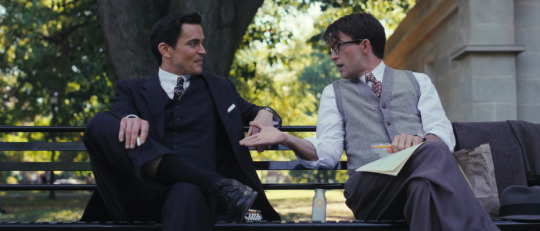
April 27, 1953 - Executive Order 10450 signed. Hawk goes to Tim's apartment and tells him about Kenny. (ep 1)
June 6, 1953 - Tim's 23rd birthday (Hawk 'misses' it because they weren't talking for 4 weeks. belated celebration in ep 3.)
June 15, 1953 (?) - date of the newspaper Tim is reading just before he goes to visit Hawk in ep 2, where Hawk makes him write the letter to Mary. I'm choosing to believe this is a mistake on the show's part, because this would mean that Hawk has already missed Tim's birthday.

June 19, 1953 - Julius and Ethel Rosenberg's execution. Hawk comforts Lucy about this at the end of ep 2. So, likely Hawk and Tim had their big fight very shortly before Tim's birthday, and weren't talking from end of May - end of June.
End of June, 1953 - at the end of ep 2, Tim says it's been 4 months since his last confession, making his last (proper) confession the end of Feb or beginning of March. (ie, before he meets Hawk again on the park bench).
End of June or beginning of July, 1953 - weekend trip to Rehoboth Beach (ep 3)
November 1953 - G. David Schine drafted into the army (ep 3)
Christmas 1953 (ep 4)
March 16 to June 17, 1954 - Army-McCarthy Hearings (part 2) (ep 5)
The second phase involved the subcommittee's investigation of McCarthy’s attacks on the U.S. Army. Known as the “Army-McCarthy hearings,” they were broadcast on national television and they contributed to McCarthy’s declining national popularity. Five months later, on December 2, 1954, the Senate censured McCarthy.
June 6, 1954 - Tim's 24th birthday
June, 1954? - Tim/Hawk break up, Hawk proposes to Lucy (ep 5)
I believe this happens at the tail-end of the Army-McCarthy hearings, so before June 17th. Unclear when the proposal actually happened though.
Fall, 1954 - Sen. Smith's funeral
based solely on fall foliage in this screenshot:

Late Nov / Early Dec, 1954 - Tim enlists in the army
based on army application: birthdate 6/6/30, age: 24 years, 6 months
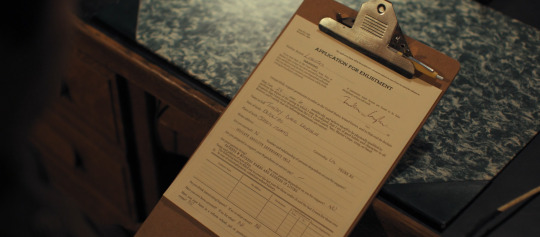
Late Nov / Early Dec, 1954 - Hawk/Tim last meeting in the tower
based on the radio program Tim is listening to, which says, "Chief Counsel Roy Cohn has resigned from the committee. And Senator McCarthy, his approval ratings plummeting, faces censure or even expulsion from the Senate." (McCarthy censured Dec 2).
Tim leaves for Fort Dix, for training, but is later stationed at Fort Polk, in Vernon Parish, LA. (thanks, @jesterlesbian!)

December 2, 1954 - the Senate censures McCarthy.
Summer or Fall 1956? - Tim's letter (that lucy burns) (ep 6)
Flashbacks, for context:
"Since he's giving up his apartment, Hawk insists on having a lair in the woods." // "I'm surprised that he finally agreed."
Lucy lets contractor go. // "Give me a baby."
Hawk is reading the Bristol Daily Courier, a paper located in Bristol, PA, a town in Bucks County, outside Philadelphia. I can't find any info on the one headline I can read though ("Heath Carlson breaks arws deadlock, locals proud"), so can't date this properly.
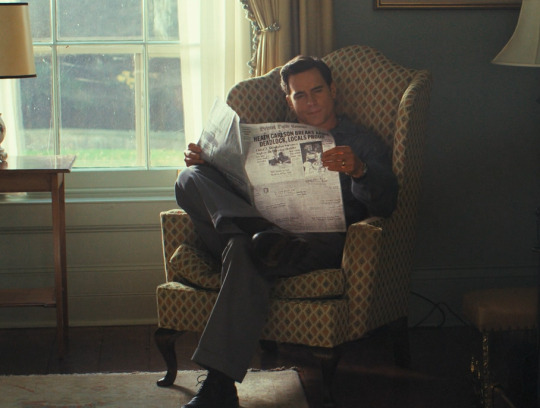
Lucy cleaning out Hawk's apartment, finds paperweight, sees Tim drop off letter. (did she start clearing out the apartment only after the cabin construction was complete? or before?)
"I went into the Army to get away from you. I thought time and distance would help. But it hasn't." If Tim sends the letter in summer 1956, it's been a year and a half since he enlisted.
Biggest question here: did lucy ask for a baby before or after she read Tim's letter??? the flashbacks don't answer this definitively.
October, 1956? - Lucy becomes pregnant with Jackson (see note under April 1957)
October 23 – November 4, 1956 - Hungarian Revolution of 1956
October 23, 1956 - April 30, 1957 - Hungarian Refugee Crisis
November 8, 1956 - Operation Safe Haven commences
President Eisenhower declared that 5,000 Hungarians would be awarded visa numbers remaining under the 1953 Refugee Relief Act
Spring 1957? - Tim sends telegram. It looks like 05-??-???? to me, which doesn't really make sense if McCarthy died on May 2nd, but it's hard to make out. or maybe telegrams used the date format dd-mm-yyyy.

April 1957? - Tim/Hawk first meeting, Lucy at least 5 (or 6? or 7?) months pregnant
You should feel your baby's first movements, called "quickening," between weeks 16 and 25 of your pregnancy. If this is your first pregnancy, you may not feel your baby move until closer to 25 weeks.
25 weeks ~= 6 months, and it still seems novel to her, so let's say she's approx. 6 months pregnant here.


May 2, 1957 - Joe McCarthy dies.
May 6, 1957 - McCarthy's funeral. Tim's first visit to Hawk's apartment (ep 8)
June 6, 1957 - Tim turns 27.
June or July, 1957 - Jackson born (based on dates above)

1958? - Kimberly is born. (estimated bc she looks the same age or older than Jackson, so assuming she's a year younger at most.)
August, 1965 - President Johnson signs a law making it a federal crime to destroy or mutilate [draft] cards.
October 15, 1965 -David Miller publicly burns his draft card, becoming the first person to be prosecuted under that law and a symbol of the growing movement against the war.
May 17, 1968 - the Catonsville Nine took 378 draft files from the draft board office in Catonsville, Maryland and burned them in the parking lot. (inspo for Tim & co. thanks @brokendrums!)
November 1968 - ep 6. Hawk is 48-9, Tim is 38, Jackson is 11.
based on this newspaper screenshot when Hawk is talking to Marcus on the phone about Tim, which shows election results (1968 election took place on Nov 5th).
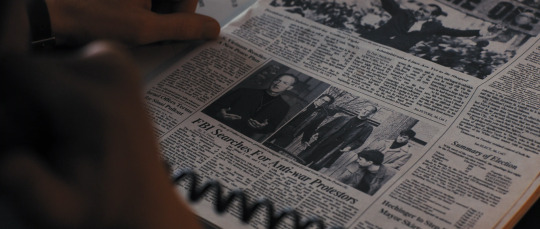
November 1968 - May 1970 (earliest) - Tim in prison. (he says in ep 7 he was in prison for a year and a half. this assumes he went to prison right away, but it could have been several months later if he was awaiting trial/sentencing.)
1970? - After prison, Tim moves to San Francisco and gets his counseling degree.
Mid-late 1970s - Tim earns his C-SWCM qualifications, requiring:
A Bachelor’s degree in social work from a graduate program accredited by the Council on Social Work Education
Documentation of at least three (3) years and 4,500 hours of paid, supervised, post-BSW professional experience in an organization or agency that provides case management services
Current state BSW-level license or an ASWB BSW-level exam passing score.
nb. because Tim already had his bachelors (from Fordham, majoring in history), I could see him entering a much-accelerated BSW program, transfering a lot of credits from his previous degree. That would give him maybe 2 more years of university, plus the required 3 years of post-BSW work = 5 years minimum before he earns that business card.
February 4, 1977 - Fleetwood Mac's album Rumours is released, including the 1970s Tim/Hawk anthem, Go Your Own Way
October, 1978 - Jackson dies

November 27, 1978 - Harvey Milk assassinated
May 20-22, 1979 - Tim on Fire Island (ep 7). Hawk is 59 or 60, Tim is 48, about to turn 49.
May 22, 1979 - Harvey Milk's (posthumous) 49th birthday (celebrated in ep 7)
1986 - ep 8
how long was Hawk in San Francisco? Timelines for the events below may be fudged in the show, bc I doubt he was there for 5 months.
March, 1986 - Roy Cohn's 60 Minutes interview, which the gang watches in ep 4.
April 15, 1986 - US bombs Libya. in the first episode you can hear reference to this on the radio, before Hawk leaves for San Francisco. (thanks @aliceinhorrorland93!)
July 27, 1986 - In California, Gov. George Deukmejian vetoes a bill that would have defined AIDS as a physical handicap calling for entitlement to protection under the state's civil rights laws.
August 2, 1986 - Roy Cohn dies (ep 8)
Late 1986? - the fundraising gala that Tim crashes, shortly after Cohn's death.
September 1986 - The State Legislature has passed another bill [in addition to the one vetoed on July 27]. Mr. Deukmejian, a Republican running for re-election, has indicated that he will probably veto the bill. (nb, this is likely the bill that Tim & co want to pressure the governor to sign).
October 11, 1987 - AIDS memorial quilt first displayed (ep 8)
--
this was a collaborative effort! many thanks to @ishipallthings for many of these details, as well as @startagainbuttercup , @alorchik, @itsalinh and others in the FT discord!
#i made this as comprehensive as i could but i would LOVE feedback/corrections#esp re: anything in 1956-1957 era#jackson's birth? and the date of that letter???#fellow travelers#timeline#reference#ft timeline#fellow travelers timeline#*
288 notes
·
View notes
Text
Favourite german colloquialisms and idioms
Ein Freund zum Pferdestehlen (lit: a friend to steal horses with) A reliable, loyal, and trustworthy friend, someone you can depend on 100%
Mit jemandem ein Hühnchen zu rupfen haben (lit: to have a chicken to pluck with someone) to have an unfinished argument/dispute/disagreement with someone that one will finish as soon as they see the person again, who will then probably "experience their blue miracle" (sein/ihr blaues Wunder erleben): get their ass handed to them.
Die Sau rauslassen (lit: to let the sow loose) To throw down at a party
Sows are generally an intensifier. Either in wie Sau (as fuck), the adverb saumäßig, or just add the prefix sau- to an adjective of your choice.
Auf dem Teppich bleiben (lit: to stay on the carpet) to quit being overdramatic, to stay grounded in reality and not let emotions take over a debate. Same meaning: Die Kirche im Dorf lassen (lit: to leave the church in the village)
Das geflügelte Wort (lit: the winged word) Figure of speech, idiom
Sich etwas ans Bein binden (lit: to tie something to one’s leg) To burden oneself with something that’s more trouble than it’s worth
Das Leben ist kein Ponyhof (lit: life is no pony farm) Life isn’t all sunshine and rainbows
Jemandem den Marsch blasen (lit: to blow the march for someone) to scold someone very harshly. Also: jemandem die Meinung geigen (to play someone one’s opinion on the violin), jemanden anscheißen (to shit on someone)
Auch ein blindes Huhn findet mal ein Korn (lit: even a blind chicken sometimes finds a seed) A stopped clock is right twice a day
Backfisch (m.) (lit: baked fish) teenage girl; this one's a bit old-fashioned
Nicht alle Tassen im Schrank haben (lit: to miss some cups from the cupboard) To be crazy, insane, idiotic. The things people can miss to express this sentiment are quite diverse (and this is something people really like to get creative with): needles from the fir tree, battens from the fence, lightbulbs from the chandelier, cookies from the jar…
Die Radieschen von unten ansehen (lit: to view radishes from below) To be dead. Variations exist with almost any plant imaginable, most notably tulips and grass
Was die Sonne nicht heilt, deckt die Erde zu (lit: what the sun can’t heal, the earth shall cover) This health problem will either resolve itself or the speaker will die from it, in any case it will be over eventually
Da warst du noch Quark im Schaufenster (lit: Back then you were curd in the shop window) Back then, you weren’t even conceived
Eine (neue) Sau durchs Dorf treiben (lit: to drive a (new) sow through the village) to manufacture short-lived public outrage that will soon be replaced by a new scandal
Hanswurst (m) (lit: Hans Sausage) a ridiculous, funny person, fool, clown (but not an actual clown from the circus)
Man hat schon Pferde (vor der Apotheke) kotzen sehen (lit: horses have been seen vomiting (in front of the pharmacy)) stranger things have happened
wilde Ehe (lit: wild marriage) to live together/have a family together without being actually married
Bauernfänger (m.) (lit: farmer catcher) Conman. Not to be confused with:
Rattenfänger (m.) (lit: rat catcher) political agitator, demagogue
Noch feucht hinter den Ohren sein (lit: to be still wet behind the ears) to be inexperienced/a newbie
Du hast wohl den Schuss nicht gehört (lit: Have you not heard the shot?) Are you out of your fucking mind?
Da sind Hopfen und Malz verloren (lit: hops and malt are lost here) A hopeless case
Völkerverständigung (f.) (lit: understanding between peoples/nations) Getting to know people from other nations, making an effort to understand their culture and showing them yours in turn. The building of international relationships based on mutual respect and equality. Diplomacy. Also: Völkerfreundschaft (friendship between peoples/nations)
Sich den Arsch aufreißen (lit: to rip one’s ass open) to work very hard
Es ist noch kein Meister vom Himmel gefallen (lit: no master has fallen from the sky yet) nobody is born an expert; keep trying and you’ll get there!
Mach mal die Augen zu, dann siehst du was deine ist (lit: close your eyes then you’ll see what’s yours) I heard this a lot as a child and now I never feel entitled to anything, ever
Da geht mir das Messer in der Tasche auf (lit: this opens the knife in my pocket) I think this is infuriating and I’m about to figuratively stab you (loads of expressions for this sentiment but this is my fave)
Kinderstube (f) (lit: children’s chamber) upbringing, education. Someone who doesn’t have Kinderstube has no manners
Waisenknabe / Chorknabe (m) (lit: orphan boy / choir boy) someone who is innocent, virtuous, well-behaved and an all-around lovely person. Often used ironically.
Maulaffen feilhalten (lit: to sell mouth monkeys) to stand around gaping with your mouth open instead of doing something useful
Ach du grüne Neune/liebes Lieschen (lit: oh you green nine/dear Lieschen) oh my!
Käseblatt (n) (lit: cheese sheet) a newspaper of very poor journalistic quality
Jemandem ein X für ein U vormachen (lit: to try to sell an X as a U) To scam or trick someone. Same meaning: Jemanden über den Tisch ziehen (to drag someone over the table). Not to be confused with:
Jemanden/etwas durch den Kakao ziehen - (lit: to drag someone/something through the cocoa) To make fun of or parody someone/something
Steckenpferd (m.) (lit: stick horse) hobby
Da will man nicht tot überm Zaun hängen (lit: where one doesn’t want to hang dead over the fence) Just to make sure you know exactly how awful this town/village and its inhabitants are
Schnapsidee (f) (lit: schnapps idea) an idea that only a very drunk person would conceive of or consider good
Held im Erdbeerfeld (lit: hero in the strawberry field) Someone who sees themself as a great hero without any real skills/achievements to back this up
Leben wie Gott in Frankreich (lit: to live like God in France) to live the high life
#i have kept this in the drafts for *foghorn noise* years#might as well post it now that i have dug it up again#i am sure i will remember 58 things i wish i had added as soon as its posted#german stuff
1K notes
·
View notes
Text
falling stars — javier peña x f!reader


masterlist | day 18 (@angstober) — falling stars
word count: 1.4k
warnings: angst, trauma, car-bomb, break-ups, no use of y/n, not proofread.
“You see, the whole shooting star concept has nothing to do with an actual star”, your monologue about astronomy began several minutes ago, and Javier was listening patiently, with a small smile on his face, “It’s a misconception. A falling star is actually just dust or rocks falling into the Earth’s atmosphere and burning up”.
“So you could say they’re all… dust in the wind?”, Javi's eyes widened with his joke as he smiled and you laughed.
“Wow, you really are witty. Congratulations for all this brain power, Javier Peña”, you mocked him, one hand coming up close to his face and making a circular motion. He chuckled, and looked back up to the night sky.
This was your second date with the DEA agent living in Medellín. You had been reallocated to the United States Consular Office in Medellín after sometime in Austria and, afterwards, East Timor. Being a career diplomat in the lowest rankings, you had less attributions than the Ambassador. But in Medellín, there were no safe positions in politics, diplomacy or law enforcement, regardless of ranking.
You didn’t feel safe, but you didn’t deal directly with drug lords like the DEA folks did. It was easier for you to go about your day, and focus on communism other than drug trafficking.
As the only other woman in the Diplomatic Mission in Colombia, you were used to dealing with self-important pathetic jerks. One day, though, you were so pissed off you were stomping through the hallways when you bumped into a tall brown-eyed man with a gorgeous suit, which made you drop your coffee, and when he began to apologize you just yelled at him with some profanity in German.
Your time in Austria really paid off.
The man next to him, a cute blond guy, was open-mouthed staring at you. When you realized you were being the jerk now, you apologized and introduced yourself.
“I’m not used to this place just yet, it’s quite different from the other Consulates I’ve been”, you tried to explain yourself without accidentally cursing high-ranking officers who could make your life hell. Maybe tossing your hair and blinking your eyes would make that man, whoever he was, let you get away with being an ass to him before 10a.m..
The shy flirting always worked, as the man had no reaction other than to smile at you. He introduced himself as Javier Peña, from the DEA, and asked what you were doing after work that night.
The rest was history, and that’s how you ended up strolling through the gardens of the nice Hotel you were staying as the touch-ups your place needed were being finalized. You were pondering inviting Javi up when you saw a shooting star, and, thus, the astronomy monologue.
Strolling in silence for a little while, the two of you didn’t meet one another’s gaze. It was a typical end-of-date dance, and the ball was in your hands as you both approached the entry of the hotel.
You stopped and turned to look at him better. He was such a beautiful man, and yet, he was all alone. What must it be like to grow up this beautiful?, you thought. You had to fight the urge to pass your fingers through his hair, which seemed softer than cotton.
The words “do you want to come up?” were practically coming out of your mouth already when a loud sound came from the streets.
Javi’s body was shielding yours before you could even realize what was going on. From the corner of your eye, you saw fire. There were screams coming from the outside too, and a part of you had to contain yourself from walking towards the chaos and try to help out somehow.
Your hands were protecting your head, and Javi was protecting you. The both of you squatted down and waited as the sounds died down a bit.
From the looks of it, and from your experience in these situations, a car had blown up.
“Are you okay?”, Javi half-yelled, his hands cupping your face and scanning for any bruises. You nodded yes as he lifted you to your feet. His hands moved from your face to your hips, and he guided you inside with care.
Even amidst this terrible scenario, he made your heart flutter.
Javi mumbled something about being right back and for you to stay put, and went to the reception to borrow their phone. Probably calling his office or his partner. You turned to watch the streets, and your suspicions confirmed themselves: a car blown up, still in flames, in the middle of the street.
No one seemed to be hurt badly, at least there was that. You look around the lobby to try and find someone you could help, something you could do, but you were much too stunned still.
That couldn’t have been for you, could it?
As your eyes wander the venue, the realization this might very well be some sort of warning for Javi hit you like a wall of bricks. The man who held your hand and laughed earlier today at the hotel’s restaurant was also a DEA agent working to catch some really bad guys. Your job was talking and writing legal documents, whilst his was on the field, with a gun, actually chasing drug lords and their minions.
What the fuck were you getting yourself into?
You watched Javi walk back towards you, hands on his hips. He was so handsome, and you wanted him in a way that would make even the devil himself blush. But you couldn’t have him, could you? Not like this, with men who put bombs in cars lurking in every corner.
When Javi was close enough to hear you, you opened your mouth to speak, and he motioned to a quieter corner. Without saying anything, you accompanied him and watched him as he sat and let his head fall to his hands.
He let out a deep sigh, not meeting your gaze, and pulled a pack of Marlboro from his pocket.
“Our being here is much like those falling stars of yours, y’know”, he looked defeated as he lit his cigarette. “We’re small rocks, dust, falling in this strange environment and burning ourselves up, and everything near, in the process”.
The smoke he let out made twirls in the air before disappearing, in quite a mesmerizing manner.
You did want to see him more, but what future was there between the two of you?
You didn’t want to be at his funeral anytime soon, and Javi was driving himself into an early grave. You were sure he knew this, and you had your suspicions he only took you out because he wanted to fuck and thought you’d be casual, and comfortable with his lifestyle. You were fine with being a hookup, but it wasn’t okay to spend a Friday night wondering if he didn’t call, not because there might be some other girl in the picture, but because he was dead.
You wouldn’t deal with this again. Life had already taken too much from you too soon.
There was a part of you that didn’t want to let Javi go home alone tonight. Not because of the sex — you weren’t in the mood, and most likely, neither was he — but because he might need a friend.
“You should maybe hang out with Steve”, you suggested, trying to play the dismissal as care. Because you did care.
His brown eyes looked up at you, cigarette still burning between his fingers. His eyes gazed down and he let out a small and sad smile.
He stood up and kissed you on the cheek, the smell of smoke and of Javi intoxicated you. “I had fun”, he mentioned, one hand holding your arm. He squeezed once before letting go. “Stay in touch, okay?”.
You didn’t find the strength in you to reply. Instead, you watched him walk away, into the busy street. You thought he’d go straight home, but no. He went to the policeman who was around the burnt car.
Men like Javi, like your father… They had this need to act at all times. Never prioritizing themselves or their loved ones, always with the big picture in mind, hurting all the individuals to protect the vast majority. Being a new version of your mother, going through sleepless nights worrying as she did, that would never work for you.
You turned around, and went to your room. Javier stayed, and helped out the police. Simple as that, and yet, somehow, it was more complicated than ever for you.
_________________________________________________________
a/n: i’m posting day 18 on day 22 because not only was i terribly sick, i also ran out of ideas, lol. so, if you happen to have any ideas for the prompts of this angstober, i’d love to hear them, on dm or ask. this IS a cry for help, because i want to write more, i just dunno where to start.
#angst#angstober 2024#angstober#fiction#writers on tumblr#pedro pascal#narcos#javier peña#javier pena x reader#javier pena fanfiction#javier pena narcos#javier pena x you#javier peña angst#narcos fanfiction#javier peña x you#steve murphy#wagner moura#fanfiction#x reader#writing challenge#writing prompt#day 18#pedro pascal x reader#javier peña x reader#javier peña fanfiction
70 notes
·
View notes
Text
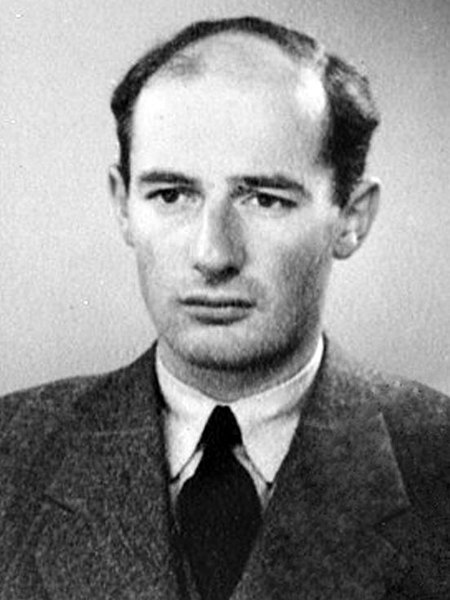
Worn and weary, balding, with sad eyes, Raoul Wallenberg looked much older than his 31 years of age when in 1944 he was assigned the responsibility of saving Jews in Hungary. The assignment came by way of the War Refugee Board, an American organization formed that same year with the goal of saving Jews from persecution by the Nazis.
Raoul, who had some Jewish lineage but was not considered Jewish, was born in Sweden to a prominent family of bankers, diplomats, and politicians. He was expected to follow in the footsteps of his family, but he decided to become an architect.
He went to study architecture in America, at the University of Michigan. During his time in college, Raoul worked odd jobs despite his family’s wealth, and hitchhiked across the US, Canada, and Mexico during holidays. He continued hitchhiking even after getting robbed and thrown into a ditch by four men who offered him a lift. In a letter to his grandfather, Raoul wrote of his love of hitchhiking, “When you travel like a hobo, everything’s different. You have to be on the alert the whole time. You’re in close contact with new people every day. Hitchhiking gives you training in diplomacy and tact.”
Raoul finished the University of Michigan with honors, even winning a medal for his scholastic achievements. Unable to find architecture work in Sweden after graduation, Raoul briefly lived in South Africa, soon moving to Palestine for a banking apprenticeship. It was in Palestine that Raoul first encountered Jewish refugees from Germany. The refugees made a strong impact on Raoul.
Upon returning to Sweden, Raoul went into the import/export business with a man of Hungarian Jewish decent. Once it became harder for his partner to travel to Hungary due to his being Jewish, Raoul started making the trips himself. He traveled frequently to Budapest, learned Hungarian in addition to his already knowing French, English, German, and Russian, and ultimately went on to head the international arm of the business, soon becoming a joint owner of the company.
In 1944 Germany occupied Hungary. At the time of the occupation, Hungary had close to 700,000 Jewish citizens. By the time Raoul arrived in Hungary on his mission of rescue, over 400,000 of them had been sent to Auschwitz.
Raoul wasted no time. He did everything he could think of to save Jewish people. He bribed, extorted, bluffed, and threatened to achieve his aims of saving as many people as possible.
With a fellow Swedish diplomat he created official looking protective passes to give out to Jews granting them Swedish citizenship and making them exempt from wearing the yellow badge that Nazis required them to wear. Sandor Ardai, one of Raoul’s drivers, recalled a time when Raoul came upon a train full of Jews about to depart to Auschwitz,
“He climbed up on the roof of the train and began handing in protective passes through the doors which were not yet sealed. He ignored orders from the Germans for him to get down, then the Arrow Cross [the Hungarian Nazi party] men began shooting and shouting at him to go away. He ignored them and calmly continued handing out passports to the hands that were reaching out for them. I believe the Arrow Cross men deliberately aimed over his head, as not one shot hit him, which would have been impossible otherwise. I think this is what they did because they were so impressed by his courage. After Wallenberg had handed over the last of the passports he ordered all those who had one to leave the train and walk to the caravan of cars parked nearby, all marked in Swedish colours. I don’t remember exactly how many, but he saved dozens off that train, and the Germans and Arrow Cross were so dumbfounded they let him get away with it!”
In total Raoul gave out tens of thousands of such protective passes, but the German government eventually caught on to the ruse and ruled the passes invalid. When Raoul heard of this, he called on Baroness Elisabeth Kemeny, the wife of the Hungarian Minister for Foreign Affairs in Budapest, for help,
‘’Raoul implored me to help. He was desperate. I talked to my husband and said he must do something. He told me ‘I can’t fight the whole cabinet.’ But after midnight word came that 9,000 passes would be honored. I can still remember Raoul’s elation, his happiness.’’ The baroness had finally persuaded her husband to help by threatening to leave him if he didn’t.
When the Germans abandoned the use of trains to transport Jewish prisoners, instead forming 125 mile death marches toward Auschwitz, Raoul began visiting stopping areas to save people.
“‘You there!’ The Swede pointed to an astonished man, waiting for his turn to be handed over to the executioner. ‘Give me your Swedish passport and get in that line,’ he barked. ‘And you, get behind him. I know I issued you a passport.’ Wallenberg continued, moving fast, talking loud, hoping the authority in his voice would somewhat rub off on these defeated people…The Jews finally caught on. They started groping in pockets for bits of identification. A driver’s license or birth certificate seemed to do the trick. The Swede was grabbing them so fast; the Nazis, who couldn’t read Hungarian anyway, didn’t seem to be checking. Faster, Wallenberg’s eyes urged them, faster, before the game is up. In minutes he had several hundred people in his convoy. International Red Cross trucks, there at Wallenberg’s behest, arrived and the Jews clambered on…”
In one of his final acts of rescue, Raoul intimidated the supreme commander of German forces in Hungary, Major-General Gerhard Schmidthuber, into not blowing up a Jewish ghetto housing 70,000 people. As the war was coming to an end and there was not enough time to send the remaining Jews to Auschwitz, Adolf Eichmann, a major organizer of the Holocaust, ordered the slaughter of all Hungarian Jews in one mass execution. When Raoul found out about this, he sent word to Schmidthuber that if he were to go through with the slaughter, Raoul would personally see that he was hanged for crimes against humanity after the war. Knowing that Hitler was close to defeat, Schmidthuber acquiesced and called off the massacre.
Raoul took such risks because his perspective on the work he was doing was simple, “I will never be able to go back to Sweden without knowing inside myself that I’d done all a man could do to save as many Jews as possible.”
In total Raoul saved close to 100,000 Jews. He himself was captured by the Soviets on suspicion of being a spy and is presumed to have died a Soviet prisoner.
Historical Snapshots
91 notes
·
View notes
Text
Lame-duck periods are meant to be inconsequential, but on Thursday afternoon at the White House, U.S. President Joe Biden got a chance to present one of the most important breakthroughs of his time in office. In what was the largest U.S.-Russia prisoner swap since the Cold War, involving at least seven countries over a period of months, a total of 24 people moved across borders as pawns in a game of global 3D chess.
Eight Russians are returning home in exchange for a combination of 16 Americans, Germans, and Russians. Within an hour of confirmation that U.S. prisoners were safely out of Russia, Biden assembled family members of the freed Americans at the White House and addressed a gathering of journalists. As he looked into the cameras, he no doubt knew that he was being closely watched by his counterparts in Beijing and Moscow, by millions of people around the world, and by history.
Even in his moment of triumph, Biden found a way to focus on the human reality of the moment. He singled out Miriam, the daughter of the released Russian American journalist Alsu Kurmasheva. It was one day until her 13th birthday, and Biden put an arm around Miriam, leading a chorus of the world’s most popular song. The joy was obviously precipitated by a major international development, but it was also the day a teenage girl would see her mother again after more than nine months in prison, convicted for the crime of writing about Russia’s army.
There’s a long list of prominent names involved in Thursday’s prisoner swap, including Evan Gershkovich, the Wall Street Journal reporter sentenced to 16 years in prison under false claims of conducting espionage, and Paul Whelan, a former U.S. Marine who was in Russia for a friend’s wedding and accused, again, of espionage. There were German citizens and even Russians, including Oleg Orlov, a human rights defender and co-chair of the Nobel Peace Prize-winning group Memorial, in prison for speaking his mind about his country’s war in Ukraine.
Journalists, tourists, and activists went one way in the prisoner exchange; on the other side was Vadim Krasikov, a former colonel in Russia’s Federal Security Service serving a life sentence in a German prison for a hit on a former Chechen fighter, conducted in broad daylight in Berlin. Others included a Russian citizen involved in international money laundering, a hacker, a credit card fraudster, and an actual spy.
The historic exchange instantly evokes imagery from the Cold War, when such transfers of prisoners were more common. But rather than the historical parallels, it is the contrasts drawn by Thursday’s events that will be remembered. There was Washington, fighting for the freedom of not only its own citizens but also Russians who dared to criticize their own government, and in stark relief there was Moscow, openly trading journalists for criminals and Nobel winners for fraudsters. The Kremlin has gleefully applauded knocks to U.S. soft power, from the misadventure of the Iraq War to the botched U.S. departure from Afghanistan in 2021, but the symbolism of the moment will have not been lost on Russian President Vladimir Putin: This exchange isn’t a great look for him. And even though Biden’s claims of a grand battle between democracies and autocracies are often criticized for being too black and white for the modern multipolar world, the lame-duck president now has a moment to mark his favorite reference in the history books.
It’s an election year in the United States, so contrasts will also be drawn around the alternate visions of Washington’s role in the world—currently being debated by surrogates for the Democratic and Republican campaigns. Former U.S. President Donald Trump has long argued for a more transactional approach to geopolitics. In such a world, there are two players—one is a winner, the other a loser. The Trump worldview prioritizes singular might over alliances; values don’t matter as much as the value of the hand of cards a player is clutching to their chest. Biden, while careful to focus on the humanity and history of the moment, couldn’t resist pointing out the difference: “For anyone who questions whether allies matter, they do.” He was referring in particular to the role of Germany, which had reportedly been reluctant to give up Krasikov. Biden personally spoke with German Chancellor Olaf Scholz in January and February, arguing the importance of the prisoner exchange.
Speaking a short while later to reporters, U.S. National Security Advisor Jake Sullivan built on his boss’s message as he detailed the roles played by Germany, Turkey, and others in the prisoner swap. “There is no more powerful example of the importance and power of allies,” he said. “This was vintage Joe Biden.”
Supporters of presumptive Democratic presidential nominee Kamala Harris are also pointing out her role, visiting the Munich Security Conference a few times as vice president and building relations with German and European leaders.
Sen. J.D. Vance, the Republican vice presidential nominee, was quick to offer an alternative view: “We have to ask ourselves, why are they coming home? And I think it’s because bad guys all over the world recognize Donald Trump’s about to be back in office, so they’re cleaning house. That’s a good thing.”
And so the race for the White House rolls on, with both sides seeking to score points and spin their version of events. Thursday will be a historic study in contrasts—between Washington and Moscow and between rules and impunity. It will also be a moment that could play a part in an American referendum on Washington’s role in the world and whether the electorate favors the slow, painstaking diplomacy of Biden or the instant gratification and drama of Trump’s dealmaking.
66 notes
·
View notes
Text

"(...) They are "Vogel", the organization under the direct control of the German emperor (*). They entered the country as diplomats and will be staying in the British palace for several months as goodwill ambassadors. (...)"
(*) About said emperor: he was Wilhem II, and son of Victoria Princess Royal, aka Queen Victoria's oldest daughter; he was, in fact, the first of Victoria's grandchildren, the first of 42!
He was disabled due to birth complications (Erb's palsy)
He was a bit of a troublemaker in childhood, and Queen Victoria considered him ""a clever, dear, good little child, the great favourite of my beloved Vicky".
(CW su1c1d3 mention) He was believed to be a "deeply repressed homosexual" (rip to you Wilhelm you would have loved pride month). There was a scandal in 1906 where a lot of ministers, army officers and the Emperor's closest bff and advisor were accused of being gay; this led to a series of court cases and su1c1d3s and it is believed that he never got over his best friend taking his own life due to having romantic feelings for him
He was so so so SO bad at diplomacy (which is why its funny he'd send goodwill ambassadors to the palace) that he would upset multiple countries at once in one single interview at a time.
Apparently he was in very good terms with Queen Victoria, and looked for her approval (he remained at her bedside as she was dying), but everyone else hated his ass because he was arrogant and rude.
58 notes
·
View notes
Text
I don't dislike polygot America but I do think people give him too much credit lmfao. I don't think America would be fluent in many languages except English, Spanish, French and maybe some German. I get why people hc him to know Chinese, Russian and maybe Hindi, but I don't think he would be fluent in it any more than what would be needed for basic conversation. Like, English is already the "basic" language used internationally for diplomacy, American and British Imperialism has basically made that a default. Why would America even care to learn anything else?
#I also really dislike the 'he actually knows every language and likes destroying them' because 1. why- what's the point its giving#“white guy surprises waiter by speaking in PERFECT Chinese!!”#2. people ALWAYS put down Louisiana Creole when making this point and like why even#aph america#hws america#hetalia#other hetalia stuff#I could word this better but I am tired rn
33 notes
·
View notes
Text
There are many things I shouldn't share about my research (because those are for the dissertation)
But I can say: Dealing with Bismarck at the German Confederation was stressful enough to make the Austrian ambassador sound like he wants to quit diplomacy as a career and go find a quiet cabin by the sea.
30 notes
·
View notes